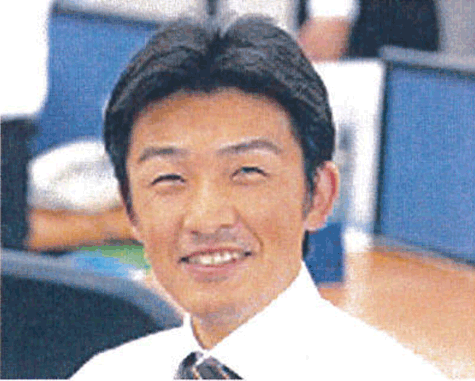Media Coverage
Our article was published in “Monthly MATERIAL FLOW” June 2012 issue.
2012/06/01P.71-73
FOCUS – Fukuda and Partners
Co-Sourcing with Specialized Expertise in Logistics Facilities, Construction and Real-Estate
F&P’s Business Model and Its Development
Tetsuya Fukuda
President and CEO
Fukuda and Partners Co., Ltd.
Fukuda and Partners Co., Ltd. (F&P) is a company attracting attention for its development of a “construction and real-estate co-sourcing” business specializing in logistics and retail facilities (Figure 1). “Co-sourcing” is not merely outsourcing, but a form of service that undertakes or supplements the clients’ construction and development functions such as comprehensive project management covering real-estate searching, facility planning, design, supervision and facility operation, by mutually sharing and utilizing management resources. The company, having commemorated the 10th anniversary of its foundation in December 2011, continues to grow with 10 consecutive years of profitability, ranking 2nd in the “Sales Rankings of Japanese Architect Offices” in the category of warehouse and logistics facilities in 2010, and achieving sales of 10 billion yen in 2011. Focusing on the company’s strategies, we interviewed President Fukuda, and also talked to key person from three of the company’s representative clients with actual results. (Editorial Department)
Supplementing and Collaborating with Cross-Industry Know-How
Hypothesis and Validation
Fukuda envisioned the business potential in the logistics field when he was starting off as a young salesperson at a major general contractor. He witnessed the front-line logistics centers of wholesale companies and was convinced they had room to develop.
Fukuda
After I joined a major general contractor I was assigned to the Tohoku (Northeast Japan) Office sales department, and there I heard that Ryoshoku Ltd. (currently Mitsubishi Shokuhin Co., Ltd.) was planning the establishment of its Tohoku RDC (Regional Distributor Center), so I went after this new business.
As a result, I was able to receive large orders for logistics facilities in Northeast Japan, and I learned that strengthening the sales force by categories led to good results.
After 9 years I was transferred to headquarters, and I became a member of an engineering sales team specializing in third-party logistics (3PL) and total logistics undertaking markets, which were developing at the time. As the leader of sales, I made a commitment to our company president that “we would achieve sales of 10 billion yen sales in 3 years,” and we achieved that as declared.
There was only 1 salesperson on the team. We built a sales strategy on how we can get 10 billion yen worth of orders in 3 years. We hypothesized and implemented a “cross-industry function supplementation sales” business model, cooperating with companies with strengths in information technology and material handling/manufacturing.
Our accomplishments were recognized, and at age 34 I became the youngest general manager, but the company was going through many changes, and I started to consider what I should do to make the most out of my life.
That’s when I came across the book Antonio Inoki’s Autobiography. In it was a poem Antonio Inoki wrote for his fans upon his retirement titled “The Path”, and the phrase I found, “Go without hesitation / Go and you will find out” gave me the push to start my own company.
I started my business from scratch. Putting up my savings, and borrowing money from my friends from my rugby team and university, and from my supporters, I founded “Fukuda and Partners” with a start-up capital of 12 million yen, paying a rent of 30,000 yen per month for an office with 3 desks.
Using Co-Sourcing to Support Supply Chain Management (SCM)
A Cross-Industry Collaboration Specializing in Logistics
Thus the company was born. At the beginning, however, there were critical moments where the company was not sure whether it can pay the employees’ next salary. Fukuda continued to work around the clock to achieve results.
Fukuda
After the foundation, I was still the only salesperson. Through networking and repeated hypothetical proposals, I expanded our business.
Since the beginning, we concentrated on the logistics market. We figured that by specializing and deepening our strengths, we could acquire more data and know-how.
Since few logistics companies had experts or dedicated departments skilled at construction and real-estates, we started by providing services that supplement the needed expertise and functions. At the same time, we implemented our “cross-industry function supplementation sales”. One example of this is our collaboration with Fujitsu, which excels in logistics equipment integration, IT solutions and management.
Even one salesperson can accomplish better results if he has an outside partner with whom he can collaborate. This led to actual achievements, and our business started to expand.
Co-Sourcing Service
What is “co-sourcing” that the company offers? Detailed examples will be introduced later, but first let’s take a look at the main service contents.
Fukuda
We started using the word “co-sourcing” in our 2nd year. Fortunately our business was growing and we were profitable from our 1st year, but to continue we had to get results from each transaction. How can we serve our clients? The repetition of listening to our clients’ voices and incorporating them into our services to meet their needs developed into “co-sourcing”.
It is a form of service evolved from outsourcing, where the recipient and supplier of the service share and utilize each other’s management resources and business processes.
Our staff who are experts in construction technology and real-estate development work together with our clients to meet their needs and solve their problems by “co-sourcing”. By concentrating our target to logistics and retail facilities, we have received high acclaim for our knowledge, insight and mobility as the experts in the field.
Supporting the Functions of Construction and Development Departments
Fukuda
Another core service is “Project Management (PJM).” We stand on the side of our client (either property & business owner or tenant business owner) and comprehensively support the implementation of development and construction projects, from real-estate searching to construction planning and construction supervision (Figure 3).
We have many actual achievements in overall support of our clients from site-selection to business scheme creation in regard to relocations and new constructions of logistics facilities for outsourcing to third-party logistics providers (3PL).
Our company can support the establishment of logistics facilities that connect the entire supply chain (manufacture, wholesale, 3PL and retail), starting from property-searching. In this sense, supporting supply chain management (SCM) is F&P’s key mission.
Only What is Necessary
Fukuda
On the other hand, we have the flexibility to support the client in only what is necessary in the project flow, such as planning only, quotation assessment only, costing negotiation only, etc.
We want more clients to utilize us and benefit from us, so we intend to serve our clients’ needs in any way they prefer. Some clients require project management from site-searching support to building completion, where some clients only wish to know if construction specifications are appropriate or if construction costs are reasonable. We can prepare data or offer advice for judgments and assessments at reasonable prices. We can also support the overall life cycle of a building, not just the construction but repairs and demolitions. We have a system of high-quality “only one” services that will meet any needs.
Co-Sourcing Services as an Infrastructure
The Slogan “Fun Innovation”
Fukuda modestly expresses his appreciation: “We couldn’t have grown without the patronage of our clients.” He is attempting to develop his business further by building “an infrastructure for the co-sourcing services” over the next 10 years.
Fukuda
In our mid-range management plan starting in 2012, we employed the slogan, “Fun Innovation.”
The slogan stands for our belief that innovations which enhance our clients’ corporate values are “fun”, that we aim to take on our tasks with new perspectives and new methods that lead to improving our clients’ corporate values. Wouldn’t it be fun to think and act together, to solve issues and create values together?
I call for the creation of many “emotional gains.” Profits are not only monetary. If we do a good job, our clients will enjoy it and be happy about it. Such “positive emotions” become important gains for our company.
I believe that is what supports our company.
Improving the Corporate Structure
Fukuda
After the Great East Japan Earthquake, everyone at our company worked hard to immediately restore logistics facilities at 72 locations (see examples on following pages). What I felt during this is that a logistics center is the lifeline of daily lives. If more people knew about our functions, we could have restored more of our clients’ facilities faster, and contributed to the communities. I also felt that construction and real-estate experts needed to be close to our clients in each localities, so we are now establishing collaborations with localized partners to strengthen our service hubs and our structure.
At the same time, we are upgrading and expanding our service structure utilizing the web and IT. We have already opened a website called “Souko.com” (http://www.sou-ko.com) that provides more information more rapidly to clients who are searching for existing warehouses.
We also want to utilize our web service to provide responses to requests for rough estimates for warehouse construction as well as other general questions. We want our clients to be able to access needed technical information more rapidly and simply. We want our services to be on hand and routinely accessible. This is what we mean by creating an infrastructure for “co-sourcing”.
With the trust F&P has built over the past 10 years as our basis, we would like to advance further with our “One More Try!” spirit and become a truly appreciated partner for our clients.
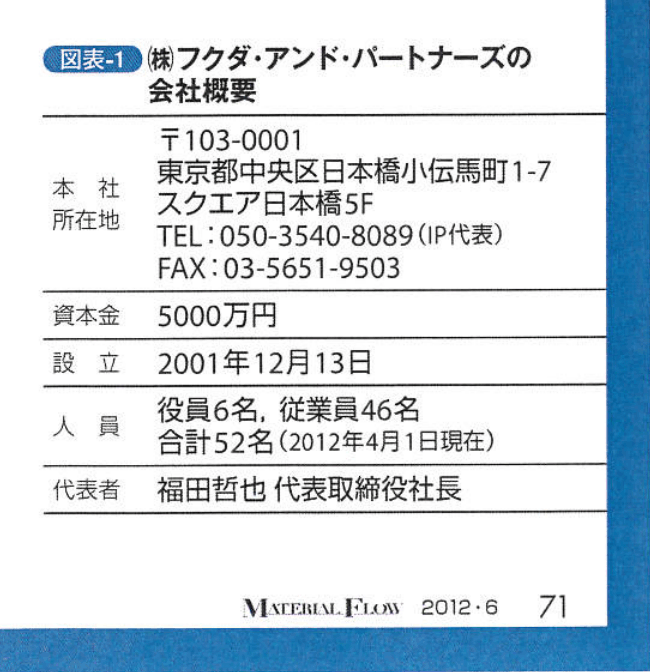
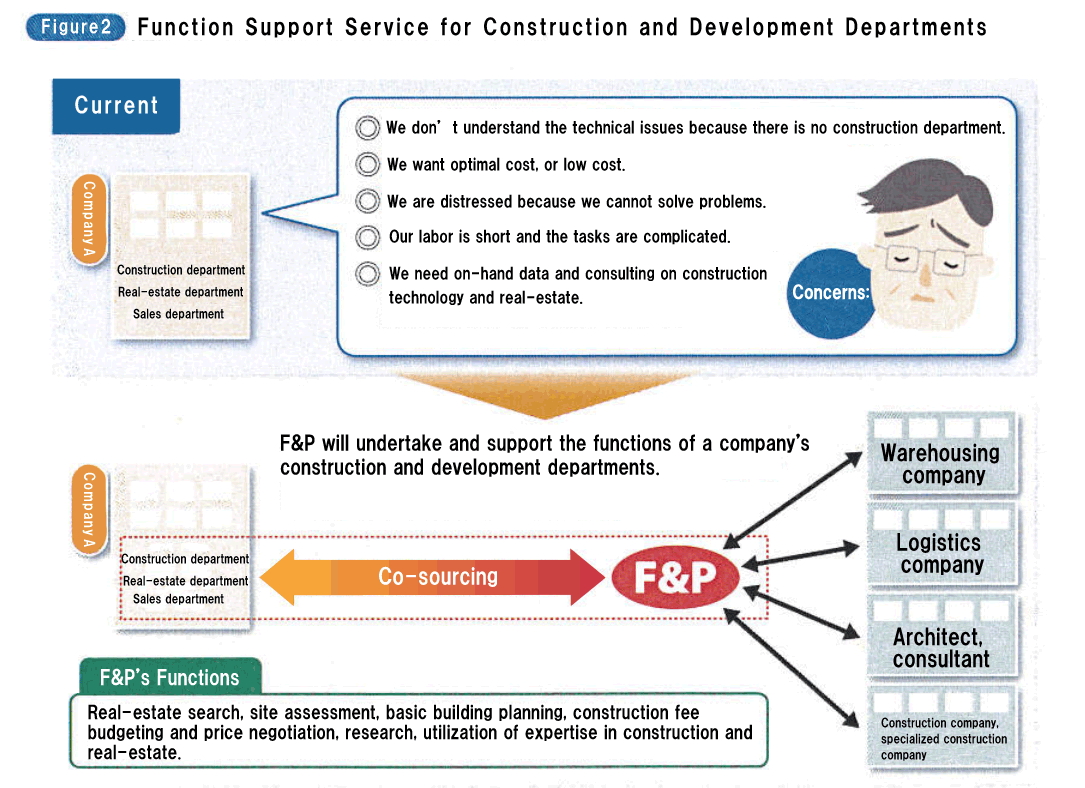
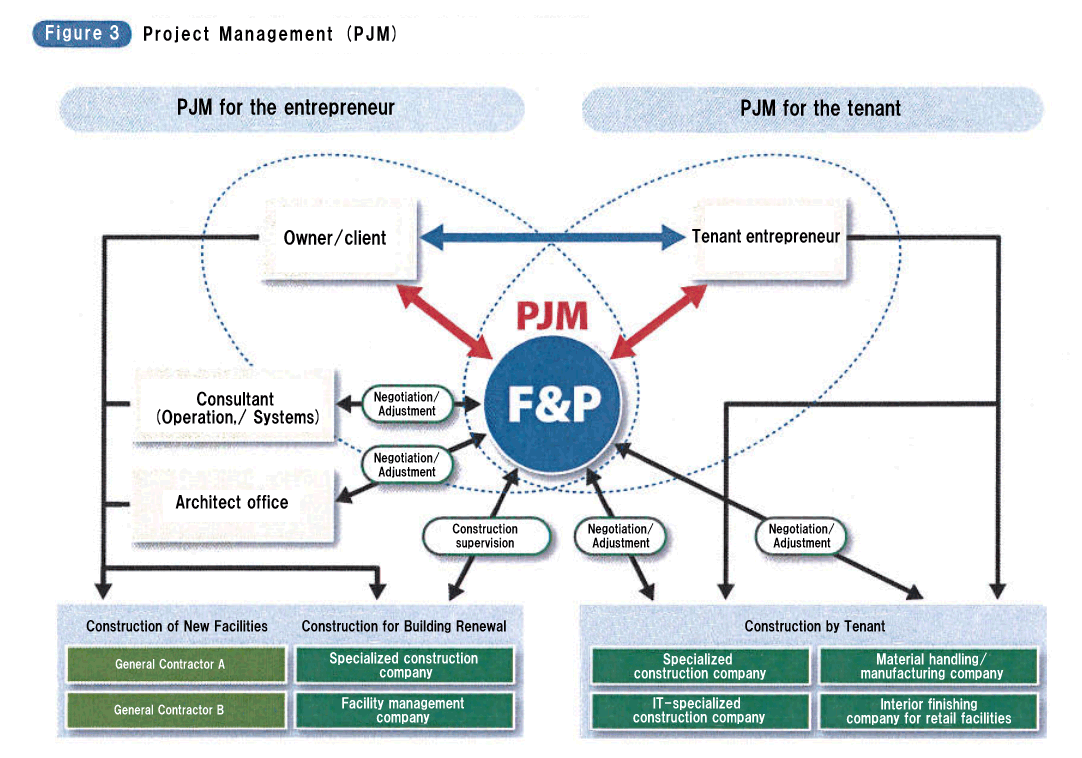
P.74-75
Co-Sourcing Case No.1 Mitsubishi Shokuhin Co., Ltd.
Diagnosing the Damaged Logistics Centers from a Professional Point of View, and Aggressively Working for Early Recovery
Tsutomu Harada
Director, Mitsubishi Shokuhin Co., Ltd.
Logistics and IT are Core Infrastructures
Mitsubishi Shokuhin Co., Ltd. (trade name changed from Ryoshoku Ltd. in 2011) is a giant in processed-food wholesaling in Japan. Having completed the mergers of four affiliated companies in 2012, it is solidifying its status as a leading corporation.
“For us, whose business is intermediate logistic, logistics and IT are core infrastructures”, says Tsutomu Harada, who has long directed the company’s logistics and supply chain management (SCM).
“Including our third-party logistics business, our trade amount is over 2 trillion yen, and to manage this volume of logistics, comprehensive hardware and software are indispensable. To find ideal properties for our logistics facilities, we have always looked to F&P for the freshest information. F&P’s value is in its ability to present us with options based on overall optimization.”
But in 2011, F&P turned out to provide another value to them. It was when the Great East Japan Earthquake inflicted damages to 100 of Mitsubishi Shokuhin’s logistics centers in Tohoku (Northeast Japan) and Kanto (East Japan). The damages in the vicinity of Sendai were the most serious.
Harada continues, “We needed to restore our facilities immediately, because our mission was to deliver merchandise to storefronts as soon as possible and prevent distress of the residents.”
“Incredibly, the day after the disaster, F&P sent over 10 of their staff to our logistics center sites. They inspected the levels of damage from their professional perspective. For the sites that could be repaired quickly they proceeded with costing and repair arrangements, and for the sites that had incurred serious damage they gave us precise advice on investigative procedures to prevent secondary damages. They went ahead with the listing up of stopgap repair needs, cost calculations and repair arrangements on our behalf. The network F&P had in place with us proved its value by allowing such a smooth collaboration in this emergency, and I was thankful for that.”
Recovery Started the Day After the Disaster
Immediately after the earthquake occurred, Fukuda contacted all his clients by e-mail and telephone, and had his employees break out to grasp the situations of all the companies and facilities that they had worked on. The next day, he sent a team of his staff to Tohoku to inspect the facilities there.
“Among the facilities we had worked on, we decided to take care mainly of those whose general contractors and building owners didn’t have sufficient time to deal with on their own, and which would affect their operation. From the night of the earthquake I spent 4 nights in the office, and starting the morning after the earthquake I spearheaded all of my staff, including those who couldn’t make it home the previous night, in efforts to restore our clients’ facilities. I believe our action was quick,” recalls Fukuda.
“Mitsubishi Shokuhin’s instructions were clear: First, the securing of safety in all sites, and second, the earliest possible resuming of operation at the sites. Thus we understood clearly what had to be done, and this enabled us to give quick and specific instructions to the construction companies. We exerted our agility in emergency construction, such as conceiving to restore tilted modular racks in a matter of days by pulling with wires. The recovery of food logistic, the lifeline of the disaster sites, was at stake. Quick recovery would deliver food to the affected areas and its people that much faster, so we went all out.”
Satoshi Sekiguchi, General Manager of F&P’s Construction Planning Support Division, who was on hand for the recovery of the client’s sites, states, “We were able to make quick decisions with our client, owing to our specialization in building logistics centers, and more importantly to our understanding of the client’s strategies through our long relationship. We were also able to send multiple teams to multiple sites, and that enabled many centers to be restored quickly.”
“At our facilities, we are proceeding as follows: 1. On-site research to determine and secure safe spaces, 2. Extraction of construction items and categorization of those into temporary and permanent work, 3. Securing of construction companies, 4. Construction process proposals, and 5. Process coordination with related construction companies.”
Contributing to Early Recovery
Damages to Mitsubishi Shokuhin’s logistics centers included automated warehouses in four of its large centers damaged by fallen products, ALC boards fallen in multiple sites, collapse of stationary racks and various damaged devices. The total damages amounted to approximately 1.6 billion yen.
However, thanks to the aforementioned efforts, aside from two sites that required 6 months for restoration, their facilities were restored rapidly, restarting operation and deliveries in April, and returning to full operation by the end of the early May holidays. In particular, their site in Iwanuma district in Sendai was restored far quicker than other neighboring facilities, surprising everybody in the area.
“F&P’s professional support during that time made a huge difference,” says Harada, citing the following examples.
“At one of the sites, the construction company had estimated that recovery would take more than a month, but with F&P’s judgment and negotiation, we were able to restore it two weeks earlier. There were other sites where power was down, but by F&P arranging for generators, chargers and floodlights, we were able to continue deliveries.”
And recently they received gratifying news that rewarded all those efforts. At a retailer that was able to provide necessity items to consumers early owing to Mitsubishi Shokuhin’s logistic centers restarting supply, the business has grown by thankful consumers increasing their visits.
“We are very happy to hear about it. At Mitsubishi Shokuhin we are considering how to structure our logistics under the new post-integration administration, and we believe that even more technical expertise and professional support will be required. The positioning of F&P as our expert partner in logistics facilities construction and real-estate will be very important to us. We hope to make further leaps with our mutual collaboration,” concluded Harada.
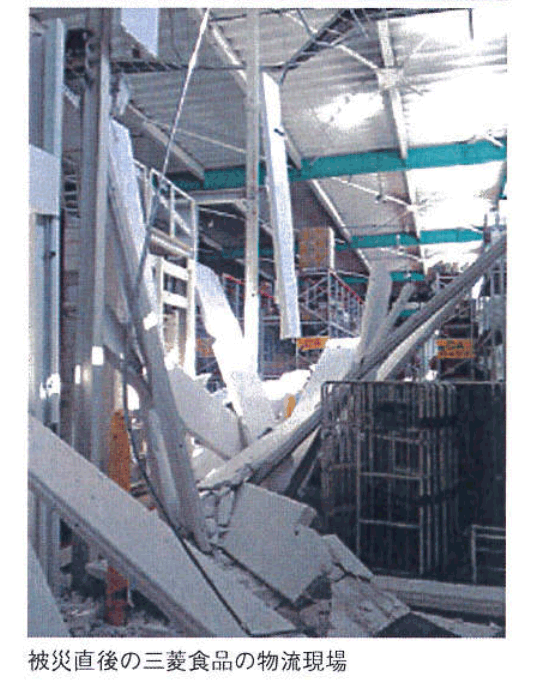
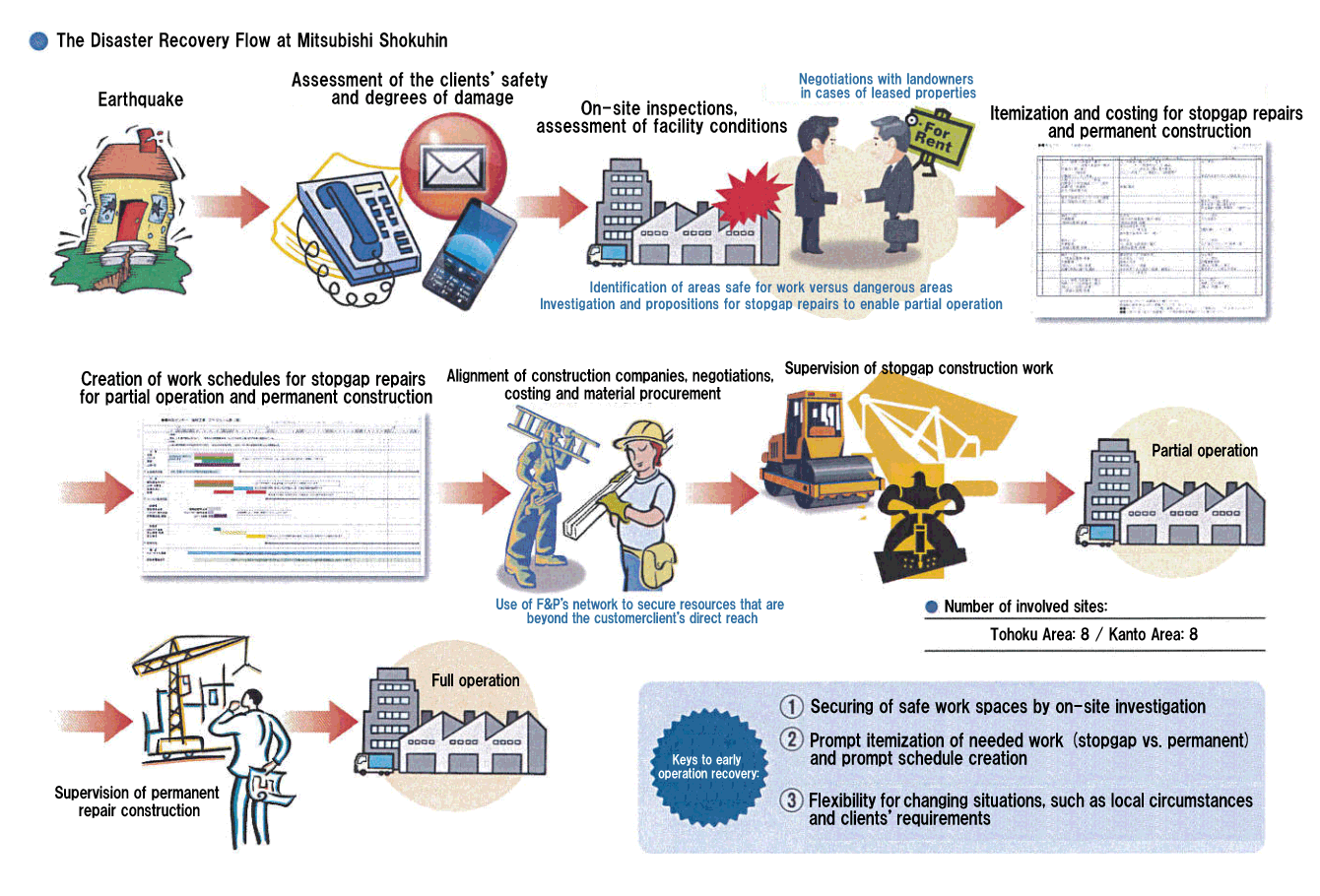
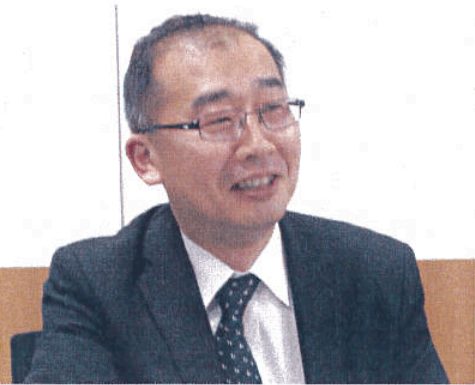
P.76
Co-Sourcing Case No.2 House Logistics Service Corporation
Satoshi Hayakawa
President and CEO
House Logistics Service Corporation
Full-Spec Project Management

Consolidating its Operations to a New Logistic Center
House Logistics Services is a logistics company that undertakes the logistics for House Foods Group logistics and also handles the logistics for other companies utilizing its expertise in food logistics. It newly established a metropolitan logistic center in Misato City, Saitama Prefecture in June 2009.
“We decided to set up a new logistic center to consolidate the operations of four warehouses in the metropolitan area,” says Satoshi Hayakawa, President and CEO of the company.
“As the merchandise volume increased, we were encountering stock imbalance among our warehouses, requiring stock transfers from one warehouse to another, so we had been thinking of consolidation. It was when we were searching for a suitable property for this, to enable business expansion, that F&P submitted a proposal to us.”
Mitsui Fudosan Co., Ltd., was finalizing the construction concept for “La La City” that utilized the former site of Japan Railway’s switchyard in Misato, and in addition to residential areas and retail facilities such as IKEA, it had decided to include logistics facilities. And F&P had immediately presented that information.
The location was ideal, being close to the interchange of the Joban Expressway and Tokyo Gaikan Expressway, so the company made a go-decision. However, the actual process of constructing the facility involved numerous complicated tasks such as negotiations and scheduling with real-estate companies and general contractors, as well as coordination with its business partners.
“We didn’t have specialists in real-estate and construction, and neither did we have time to spare for tasks outside our field. So we decided to delegate to F&P the entire management process from planning and design to construction and completion. They became our substitute construction division.”
Thus F&P, following property search and assessment, was entrusted with all-inclusive project management (PJM) for facility construction. They went ahead with a full-spec PJM process including construction plan proposition and coordination with related parties to construction supervision.
Complete Reliability
Takanori Ono, Executive Officer of F&P, who was in charge of this project, says, “We grasped the client’s requirements, such as the consolidation of order centers and offices in the metropolitan area to the same facility. We also visited the client’s other warehouses. Based on what we learned, we laid out a plan that would be optimum for a logistic center that receives House products from their factories and delivers them to contracted wholesalers.”
“We redrew our schematics many times, fitting it to the irregularly-shaped property, positioning the building walls and providing greenery space in consideration of adjoining residential areas, and optimizing traffic flow. Concurrently we had negotiations with the proprietor, the general contractor, and the local authorities.”
One problem was that the land proprietor was a specific purpose company invested by the real-estate company and general contractor that was to be dissolved after the transfer, and could not assume responsibility for any defects. So F&P negotiated to have this company remain operative until the completion of the construction. In addition, F&P handled all the complicated and wide-ranging procedures involving the authorities and lawyers, such as negotiations with the municipal government in regard to the use of public roads, as well as obtaining agreements from adjoining residents to a 24-hour operation facility neighboring their homes.
Hayakawa evaluates F&P highly. He says, “Even our knowledge of the technical terms were limited. But just by conveying our requests, F&P presented us with options that we could compare and choose within our budgetary conditions. We were able to delegate to them the logistics center construction process entirely at a reasonable cost. We couldn’t have done this without them.”
We still consult with them whenever we are building a warehouse, and they give us advice on just the issues necessary. Their services are extremely convenient. I don’t think there are any other companies that provide such services.”
The Metropolitan Logistic Center, completed with a property area of 18,178 square meters and total floor space of 17,911 square meters, continues full operation to this day.
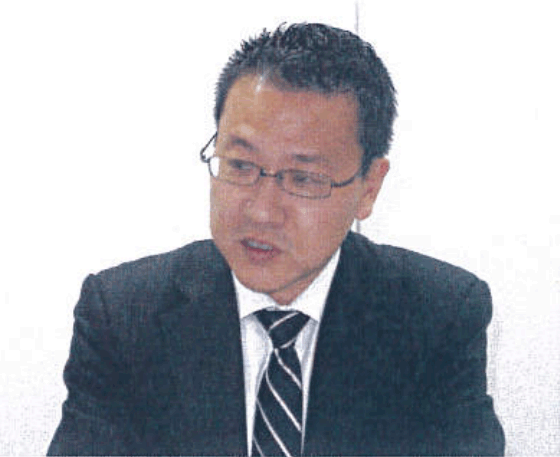
P.77
Co-Sourcing Case Example No. 3Meisho Unyu Co., Ltd.
Shinichi Kato
President and CEO
Meisho Unyu Co., Ltd.
Business Expansion with Design and supervision of a New Logistic Center An Optimum Proposal from a Professional Perspective
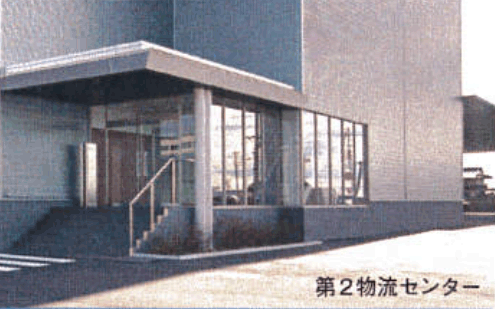
A Proposal that Envisions the Future
Meisho Unyu was founded in 1969 and is headquartered in Ama District, Aichi Prefecture, adjacent to Nagoya City. In recent years they are beginning to stand out as a leader not only in transport and delivery services but also as a third-party logistics provider (3PL) for major retail companies, handling the development and operation of logistics centers.
It was in 2006 that the company decided to build a second logistic center in front of their headquarters to expand their business. Shinichi Kato, who became the company’s president in April 2012, headed this project as an executive director at the time.
“Our idea was to build a one-story facility of 8,300 square meters with one office, on a property of 19,800 square meters, for a client with whom business was secured,” says Kato.
“We asked F&P for the design and supervision of this, and they came back with a proposal for a 2-story facility with two offices. We really appreciated the fact that they brought a versatile and convenient design that took into account our business expansion potential, and gave us the room to handle multiple clients.”
The second logistic center, a 2-story facility with total floor space of 18,900 square meters, was completed in January 2008, and it undertook the logistics for Mitsubishi Shokuhin. Another client contracted it soon afterward. The facility is highly acclaimed for its user-friendliness, and it maintains a high utilization
rate.“We didn’t have to explain the detailed specifications required in building a logistics facility, such as the floor elevation or awning height. As experienced professionals in logistics, their design was well thought out from the viewpoint of the client and actual use. Including the exterior, they organized a design that we wouldn’t have been able to put together on our own. An average architect office couldn’t do this.”
For example, the two warehouse sections each have an elevator, and have two and three vertical conveyors respectively. Truck berths are available on three sides of the facility for versatile operation. The exterior, the entrance and even the lounge is designed to express Meisho Unyu’s esteem.
Aiming to Become a National 3PL Company
Yuichi Yamada, General Manager of F&P’s Design Division, who handled the logistic center’s design, says “Countermeasures for the soft ground was the most challenging. We prevented subsidence by soil improvement and bedrock piling.”
“We made our best plan within the limited budget. Pillar spans were set to enable optimum pallet rack layout, and traffic routes were laid out so that trucks can move to and from the existing main logistic center, allowing for the two facilities to function as one.”
Meisho Unyu is now considering the construction of a new logistic center in Shizuoka, and is already in discussions with F&P.
Kato envisions, “We are aggressively trying to enter the Tokyo Metropolitan Area market with the slogan “from regional to national”. By working with F&P, we know we will be able to build a new logistics hub without worrying about having any regrets after completion.” In addition, the company became the first domestic logistics company to complete the pilot audit for “Road Traffic Safety Management,” which is scheduled to be officially implemented as ISO 39001 in November 2012. The company continues to move forward with its differentiation strategy. (For details access the company’s website http://www.meisho-unyu.co.jp/)
